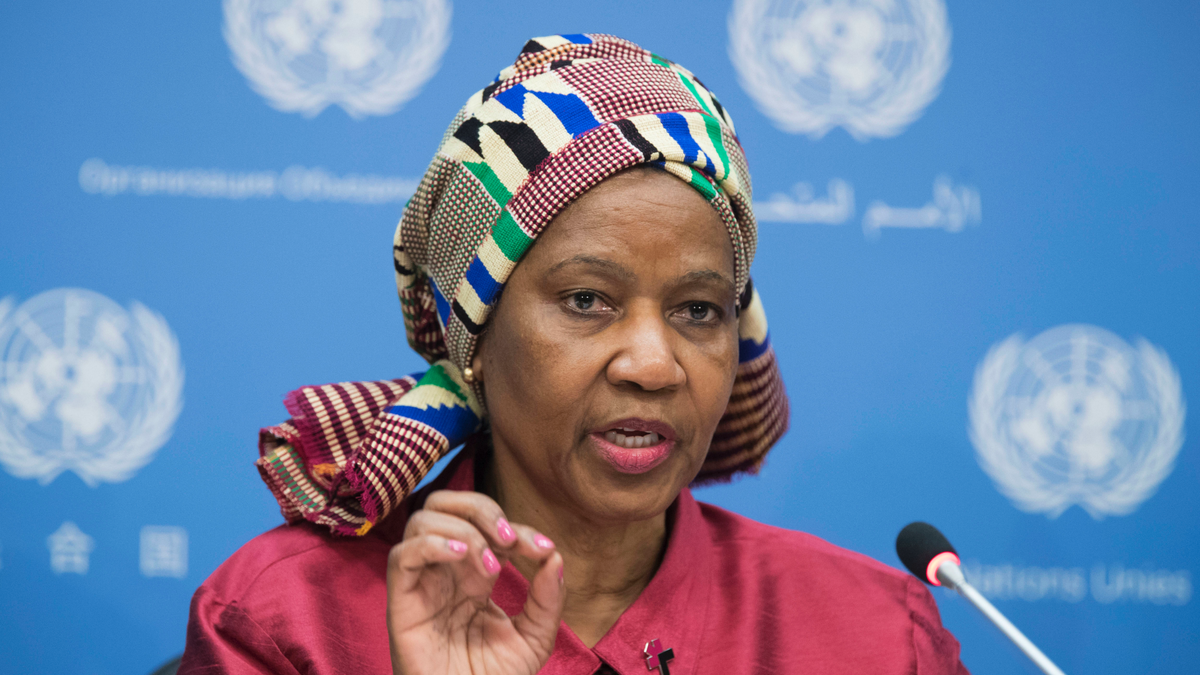
UNITED NATIONS – The United Nations began campaigning to end violence against women decades ago, but its effort gained little traction — until the outpouring of allegations of sexual misconduct against powerful men in Hollywood, the U.S. Congress and boardrooms put the issue on front pages and TV screens around the world.
The U.N. women's agency now hopes to capitalize on the spotlight.
"This is the moment!" Phumzile Mlambo-Ngcuka, the executive director of UN Women, said in an interview ahead of the International Day for the Elimination of Violence against Women on Nov. 25. "It really has to come out of the woodwork."
She credits the surge of allegations to the rising power of women who now sit in boardrooms themselves and are sympathetic to women who are bringing complaints.
"In the past, the story would have just been shoved under the carpet," she said. Now, she said, "women are being believed more and more."
Sexual harassment, abuse and rape have been taking place as long as women have gone out to work, Mlambo-Ngcuka said. "Why has it taken so long before so many women have courage to speak out?"
Answering her own question, she said that besides more women being in positions of power, there are better regulations and policies, and she pointed to "the increase in the bravery of the women to actually complain about the perpetrators who are otherwise powerful."
Mlambo-Ngcuka said she believes the issue has become more visible in recent years because perpetrators are facing repercussions such as lost jobs and lawsuits and also because high-profile men are being hit with allegations.
She singled out the late British entertainer Jimmy Savile, described by police in 2013 as a sexual predator who allegedly committed 214 offenses, including 34 rapes, over more than half a century, the majority against youngsters under age 18. The charges emerged after Savile died in 2011.
She also pointed to pioneering black actor Bill Cosby, once known as "America's Dad," who has been accused by more than 50 women of forced sexual contact over decades and is facing a second trial — and to Harvey Weinstein, fired from his movie company after a New York Times expose of sexual harassment and assault allegations against him that was followed by similar tales from more than 100 women. And she noted the claims against the Republicans' Senate candidate in Alabama, Roy Moore, who is alleged to have gone after young girls. All three men have strenuously denied wrong-doing.
Mlambo-Ngcuka said a staggering number of women have come forward to accuse a growing number of powerful men. She said the women have never met and they "could not have concocted a story," and that makes it difficult to say that "these women are lying."
"The drama and the publicity of the consequences for those who have become abusers, literally in the last couple of months, is shifting away this whole concept of not being believed," she said.
"In fact when people don't believe you, the spotlight is on them for daring to disbelieve a woman," she said. "And I think that's a good thing."
But Mlambo-Ngcuka said women still face an uphill struggle, especially in many countries where there aren't a lot of powerful women to support them. She said much more needs to be done to combat sexual misconduct and other forms of violence against women globally.
UN Women estimates 35 percent of women worldwide have experienced either physical or sexual violence or both from an intimate partner or non-partner, though some national studies put the figure from an intimate partner as high as 70 percent.
Mlambo-Ngcuka said it's time for men and boys to take much more responsibility.
"This is a man's problem," she said. "Most of our work on fighting against violence and other ills has been dedicated to what women can do to fight for themselves, to protect themselves."
Mlambo-Ngcuka, who is from South Africa, quoted the late Nelson Mandela as saying that "when good men do not do anything where there are violations against women, there is a conspiracy against women."
The U.N. has several campaigns that involve men to promote equality, including HeForShe and Gender Champions, but she said it's not enough.
She said the pace of dealing with allegations of sexual misconduct and violent acts targeting women also must be stepped up and laws in many countries need changing, including in 42 mainly Middle East, African and Latin American nations where there are no laws on domestic violence.
Mlambo-Ngcuka said every form of violence traumatizes women, whether it's sexual harassment at work, domestic violence, bullying in cyberspace or being married off as a child.
The United Nations marked the International Day for the Elimination of Violence against Women on Wednesday because of the long Thanksgiving holiday weekend in the United States.
U.N. Secretary-General Antonio Guterres said at a commemoration that women's rights activists are being targeted at alarming levels, female politicians are more likely than men to encounter violence, and recent reports of sexual harassment in the workplace worldwide show "how pervasive this form of sexual violence is."
He said violence against women and girls — "the most visible sign of pervasive patriarchy and chauvenism" — will only end "when gender equality and the full empowerment of women" become a reality.
Guterres also voiced support for UN Women's ongoing campaign, "UNiTE to End Violence against Women by 2030," which starts with 16 days of activism to end gender-based violence. This is the first year the campaign set a target date to end violence against women.
"Today we UNiTE again to say this is NOT the world we want to live in," Mlambo-Ngcuka said.
"We stand with women who are finding their voice and summoning their courage to expose powerful men who prey on the less powerful," she said.
Mlambo-Ngcuka said justice for women, sanctions and accountability are critical to change behavior so that coming generations "are socialized differently" and know that violence against women and girls in any form is not acceptable.








































